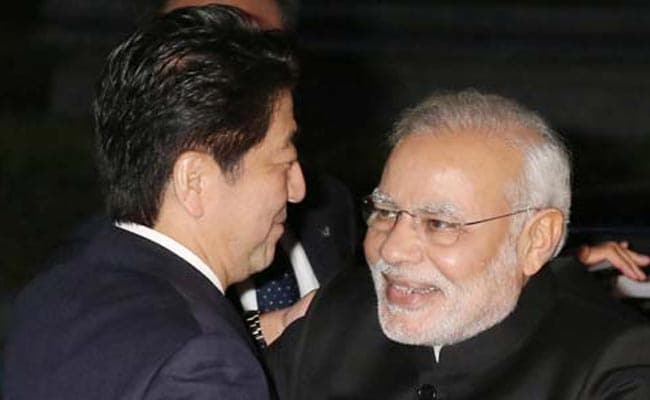India, Japan, Australia on 'Same Page' Regarding Chinese Assertiveness: Japanese Minister

File Photo: PM Narendra Modi with Japanese Prime Minister Shinzo Abe
New Delhi: India, Japan and Australia are on the "same page" over increasing assertiveness of China in the disputed South China Sea, Japanese Vice Foreign Minister Akitaka Saiki said on tuesday.
Asserting that an aggressive posture was a matter of grave concern to his country, Mr Saiki said issue was discussed at length at the first-ever trilateral meeting of India, Australia and Japan held in New Delhi.
He was asked if the issue of China's assertiveness in the region was discussed.
Mr Saiki, who also held a bilateral meeting with Foreign Secretary S Jaishankar on tuesday, said "particularly since the government and the Chinese Communist Party are being led by Xi Jinping, China is showing a different kind of a face. Under Hu Jintao, China behaved in a more reserved manner whereas Xi Jinping seems to be more outgoing. Some describe it as aggressive while others put it as self-assertive".
The Minister, who was addressing an ORF seminar, termed the country's dispute with China over Senkaku islands as a matter of "great security concern."
He said the Indian Ocean, the Pacific Ocean, East China Sea and South China Sea are linked in security terms and vital for the security of the Indo-Pacific region as a whole.
During their trilateral, the countries discussed a range of issues including the security situation in the Asia Pacific as also infrastructure and developmental projects.
Talking about bilateral ties with India, he claimed the commonalities between Prime Minister Narendra Modi and his Japanese counterpart Shinzo Abe are helping economies of the two countries in making "upward trends".
"The two countries have new political leaders. There are three things that are common between Modi and Abe. They are very dynamic, very strategic and very vibrant. They have become good friends and meet frequently in various forums.
"With the new leaders, the economies are also making new upward trends. Japan and India call each other special, strategic and global partners. As special partners sharing strategy and global vision, there are many other things the countries should be doing together," Mr Saiki said.
Mr Saiki said that groundwork was afoot for Mr Abe's visit to India scheduled towards the end of this year. "Will be making preparations so that they demonstrate the strength and trust that exist between the two countries."
Asked about Japan's possible participation in the Malabar series of naval exercise, he said that "Japan was very keen to participate in the maritime exercises. You will soon find out".
Asserting that an aggressive posture was a matter of grave concern to his country, Mr Saiki said issue was discussed at length at the first-ever trilateral meeting of India, Australia and Japan held in New Delhi.
He was asked if the issue of China's assertiveness in the region was discussed.
Mr Saiki, who also held a bilateral meeting with Foreign Secretary S Jaishankar on tuesday, said "particularly since the government and the Chinese Communist Party are being led by Xi Jinping, China is showing a different kind of a face. Under Hu Jintao, China behaved in a more reserved manner whereas Xi Jinping seems to be more outgoing. Some describe it as aggressive while others put it as self-assertive".
The Minister, who was addressing an ORF seminar, termed the country's dispute with China over Senkaku islands as a matter of "great security concern."
He said the Indian Ocean, the Pacific Ocean, East China Sea and South China Sea are linked in security terms and vital for the security of the Indo-Pacific region as a whole.
During their trilateral, the countries discussed a range of issues including the security situation in the Asia Pacific as also infrastructure and developmental projects.
Talking about bilateral ties with India, he claimed the commonalities between Prime Minister Narendra Modi and his Japanese counterpart Shinzo Abe are helping economies of the two countries in making "upward trends".
"The two countries have new political leaders. There are three things that are common between Modi and Abe. They are very dynamic, very strategic and very vibrant. They have become good friends and meet frequently in various forums.
"With the new leaders, the economies are also making new upward trends. Japan and India call each other special, strategic and global partners. As special partners sharing strategy and global vision, there are many other things the countries should be doing together," Mr Saiki said.
Mr Saiki said that groundwork was afoot for Mr Abe's visit to India scheduled towards the end of this year. "Will be making preparations so that they demonstrate the strength and trust that exist between the two countries."
Asked about Japan's possible participation in the Malabar series of naval exercise, he said that "Japan was very keen to participate in the maritime exercises. You will soon find out".
No comments:
Post a Comment